
Giovanni Bellini Madonna and Child with St. John the Baptist and Female Saint 1500-04

Yes it is. And so of course the UK talked about one thing only. Did Corbyn call Theresa May a ‘stupid woman’ or did he say ‘stupid people’ about a group of Tories, as a whole contingent of lipreaders claimed?
They sure know what’s important, and what not.
• It’s 100 days to Brexit (Ind.)
The vote of the House of Commons on the Brexit deal will now be in the week beginning 14 January, the prime minister confirmed on Monday. She hopes that her MPs are slowly coming round to the deal as the least worst option. She may also hope that Jeremy Corbyn gives his MPs a free vote, in which case enough of them may vote for her deal as a way of avoiding another referendum. It still seems more likely that Theresa May will lose, in which case the Brexit timetable will slip further. She would probably then ask the Commons to vote again after it had rejected the other options.
The one that is easiest to eliminate would be that of leaving the EU without a deal, even if it were dressed up as a “managed no deal” – at least, it ought to be easy to eliminate this option, but, until all the hoops have been jumped through, a no-deal Brexit remains the default, which is why there was such a fuss about no-deal planning at yesterday’s cabinet. The more difficult course for parliament to rule out is that of postponing Brexit and holding a referendum. If Corbyn backs a final say referendum, a Commons vote could be close, but, if May can defeat that option, she could then ask MPs to vote again on her deal. That seems to be her plan: to wear parliament down. That way she might finally win the vote at a second attempt a week later, in the week beginning 21 January – or even after that.
By then, the country would be running out of time to complete Brexit by 29 March. The problem is that a vote to approve the deal, important though it is, is only one of the things that need to be done to take us out of the EU. Once the deal has been approved, parliament also has to pass legislation to give effect to the withdrawal agreement in UK law. This will be called the EU (Withdrawal Agreement) Bill – yet another bill that sounds similar to all the others. It will be a complex and contentious bill that will be tricky to get through a hung parliament. In particular, it will contain a mechanism to entrench parts of the withdrawal agreement in UK law and make it hard for future parliaments to change them.

Well, not really. Powell and his predecessors built such a huge zombie that it can’t be called a market. So he’s not breaking a market but a zombie, and how exactly can that be a bad thing?
• Powell Breaks The Market (ZH)
“Everything was awesome” and then Jay Powell said… Some years ago, we took away the lesson that the markets were very sensitive to news about the balance sheet, so we thought carefully about how to normalize it and thought to have it on automatic pilot, and use rates to adjust to incoming data. That has been a good decision, I think, I don’t see us changing that…. we don’t see balance sheet runoff as creating problems” And everything broke…
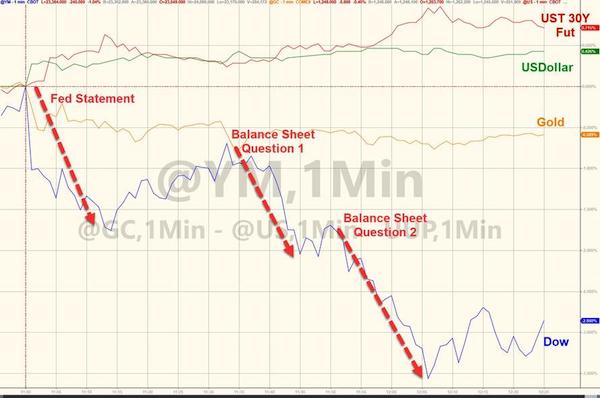
Overnight futures show hopeful buying – “surely The Fed will deliver and capitulate… for goodness sake, someone has to rescue my FANG portfolio!!??” – But The Fed did not – cutting their rate outlook by a mere one hike, with plenty still seeing 3 hikes ahead in 2019…
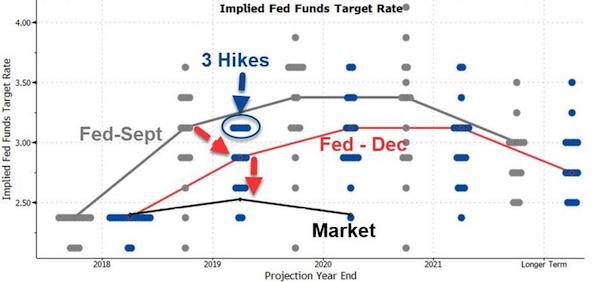
The market now expects 18bps of RATE CUTS in 2020!!!
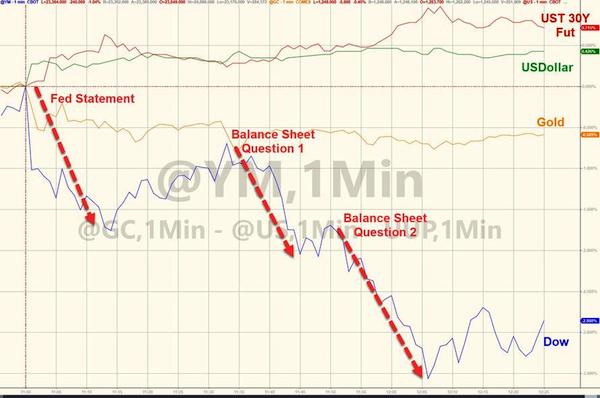
And Futures collapsed…
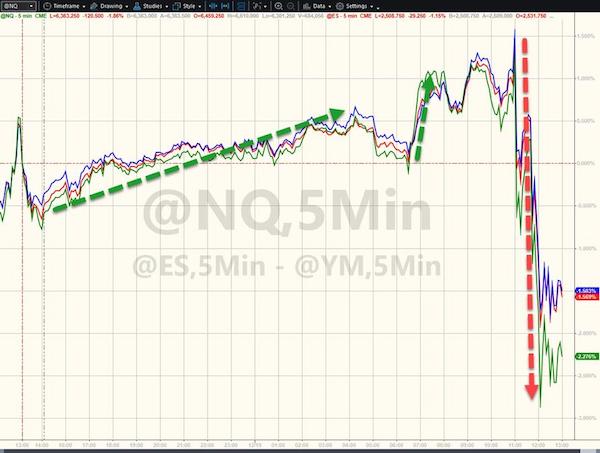

Same here with my buddie Jesse: comparing what happens with today’s zombie, with functioning markets of the past, is dangerous and of limited value.
• A Major Technical Breakdown Just Occurred In Stocks (Colombo)
The much-anticipated December Fed meeting has finally come and gone, and the stock market did not like what it heard. The Fed raised rates by 0.25% and cut its expectation for 2019 rate hikes from three to two. Because the Fed didn’t sound as dovish as many investors would have liked, the S&P 500 promptly fell 1.54% to a fresh 2018 low. From a technical perspective, today’s action is extremely concerning because the S&P 500 broke the key 2,550 to 2,600 support zone that I’ve been showing for the past couple months. Today’s breakdown increases the probability of further bearish action unless the index somehow manages to close back above that zone.
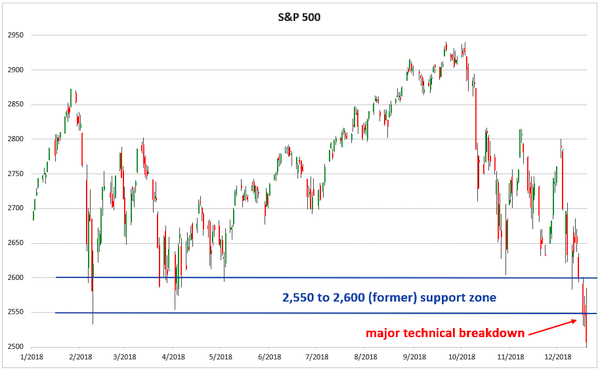
The longer-term S&P 500 chart shows how critical today’s breakdown is. Today’s breakdown is the second important technical breakdown in recent months (the first one being the break below the trendline that formed in early-2016, which I said was a bad omen). Assuming today’s breakdown remains intact, 2,100 (the 2015 and 2016 highs) is the next price target and support level to watch.
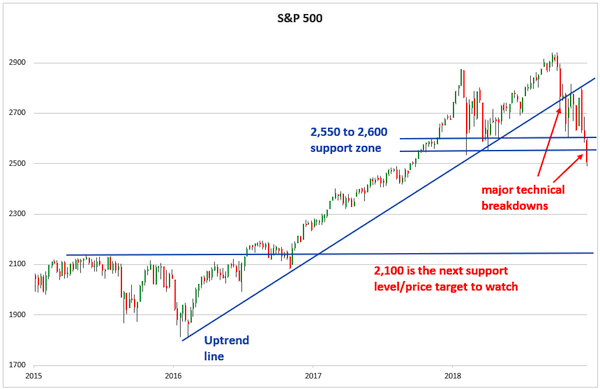

Peter Schiff appears to agree with me, only he calls it a house of cards, not a zombie.
• Peter Schiff : Not A Bear Market But ‘A House Of Cards The Fed Built’ (MW)
Where in the world is Peter Schiff, as the stock market entered an apparent unraveling phase? Find the chief executive of Euro Pacific Capital, a longtime gold bug and market pundit, on a beach in Puerto Rico, where he’s taken up residence as he watches the equity market get rocked. “I’m watching the U.S. economy implode from the beach,” Schiff told MarketWatch during a recent phone interview. “We’re in a lot of trouble,” he said. “This isn’t a bear market, we’re in a house of cards that the Fed built,” he said. Indeed, despite recent attempts to rebound, the Dow Jones is on track for its worst year since 2008 — down by about 3.5% — when the financial crisis brought global markets to their knees, according to Dow Jones Market Data.
The same goes for the S&P 500 which would also notch its worst year in a decade, if its roughly 4% decline thus far this year hold. Schiff is a polarizing figure on Wall Street, a man that critics say has harbored a persistent and unrealized post-crisis narrative for the Fed’s monetary policy, with predictions of soaring inflation and a dollar collapse. However, the prominent investor should be worthy of investors’ attention, on the back of his prescient calls ahead of the 2008 financial crisis, which earned him plaudits as one of the few able to spot a global economic crisis emanating from the housing market.

“The Fed’s been a huge friend of the stock market and they are now a little bit of an enemy and will probably become worse of an enemy..”
• Asian Shares Battered After Fed Raises Rates For Fourth Time (G.)
Asian stock markets have taken a battering after the US Federal Reserve voted to raise borrowing costs for the fourth time this year, signalling a further squeeze on liquidity around the world. In Tokyo, the Nikkei closed down nearly 3% to its lowest point for 14 months as the Fed’s pledge to continue with “gradual” rate hikes next year sent shivers through financial markets. Shares in Hong Kong and Seoul were both down more than 1% while stocks in Sydney finished at a two-year low. Futures trading pointed to a drop of 2% in the FTSE100 index in London and the Dax in Frankfurt when when the markets open on Thursday morning.
Investors’ confidence that the global economy is headed for a significant slowdown was further weakened when China’s central bank introduced a new lending facility for small private businesses, which was seen as a targeted rate cut designed to kickstart the spluttering economy. The move by the People’s Bank of China shows the two biggest economies are out of step with Beijing responding to a rate hike in the US with a de facto cut. The Shanghai Composite share index was down nearly 1% in afternoon trade while the yuan wad fixed 0.22% lower against the US dollar. [..] “The Fed’s been a huge friend of the stock market and they are now a little bit of an enemy and will probably become worse of an enemy before this is all over,” Bob Doll, Nuveen chief equity strategist and senior portfolio manager, told Bloomberg.

McConnell saves the day…
• Short-Term Funding Bill Announced To Stop Trump’s Government Shutdown (Ind.)
Senate Majority Leader Mitch McConnell has introduced a short-term spending bill to finance the US government and avoid a shutdown at the end of the week Mr McConnell, the leading Republican in the Senate, said that the funding bill known as a continuing resolution “will ensure continuous funding for the federal government” until 8 February. The short-term bill needs to be approved by both the Senate and the House of Representatives before it can proceed to President Donald Trump’s desk to be signed into law. Mr McConnell’s bill comes as Congress races against time before funding for the government runs out on Friday at midnight, amid a contentious push by Mr Trump to make $5bn worth in funding for his controversial border wall a requirement for any spending agreement.
But, while Mr Trump had indicated that he would take responsibility for a shutdown in order to make a point about the wall, the White House has since stepped back from that threat. We have other ways that we can get to that $5 billion”, White House Press Secretary Sarah Huckabee Sanders said on Tuesday. On the Senate floor, Mr McConnell lashed out at Democrats, who will reclaim their House majority in January, for failing to give Mr Trump any of the $5bn he has asked for. “This seems to be the reality of our political moment,” Mr McConnell said. “It seems like political spite for the president may be winning out over sensible policy.”

We’re going to see endless and contradictory ‘analyses’ of this. It’s already drawn out the likes of Lindsey Graham and Mario Rubio and exposed them as deep state soldiers.
• Trump Plans Full Withdrawal Of US Troops From Syria (AFP)
The United States will withdraw its troops from Syria, a US official told AFP on Wednesday, after President Donald Trump said America has “defeated ISIS” in the war-ravaged country. The stunning move will have extraordinary geopolitical ramifications and throws into question the fate of US-backed Kurdish fighters who have been tackling Islamic State jihadists. “We have defeated ISIS in Syria, my only reason for being there during the Trump Presidency,” the Republican president tweeted. The US official told AFP that Trump’s decision was finalized Tuesday. “Full withdrawal, all means all,” the official said when asked if the troops would be pulled from all of Syria.
Currently, about 2,000 US forces are in Syria, most of them on a train-and-advise mission to support local forces fighting IS. The official would not provide a timeline for a withdrawal, saying only: “We will ensure force protection is adequately maintained, but as quickly as possible.” Echoing Trump, White House spokeswoman Sarah Sanders said IS has been defeated territorially, noting the US-led coalition that includes dozens of nations would continue fighting IS. “These victories over ISIS in Syria do not signal the end of the Global Coalition or its campaign,” Sanders said in a statement. “We have started returning United States troops home as we transition to the next phase of this campaign.”
[..] Republican Senator Lindsey Graham, a Trump ally, said the president’s decision was shortsighted. “President @realDonaldTrump is right to want to contain Iranian expansion,” Graham said on Twitter. “However, withdrawal of our forces in Syria mightily undercuts that effort and put our allies, the Kurds at risk.” Charles Lister, a senior fellow at the Middle East Institute, called the decision “extraordinarily short-sighted and naive.” “This move will look like a ‘withdrawal,’ not a ‘victory,’ and yet more evidence of the dangerous unpredictability of the US president,” Lister said. “This is not just a dream scenario for ISIS, but also for Russia, Iran and the Assad regime, all of whom stand to benefit substantially from a US withdrawal.”

It is quite possible that the deep state will eventually swallow Trump’s announcement whole. However, if he had gone through the usual channels to make his announcement, they would have caught it before it became public. That’s why he has Twitter.
• Don’t Hold Your Breath on US Troop Withdrawal from Syria (CN)
The announcement on Wednesday that the U.S. will withdraw all remaining troops from Syria within the next month looked at first like a rare victory for Donald Trump in his admittedly erratic opposition to senseless wars of adventure. “We have defeated ISIS in Syria, my only reason for being there,” the president tweeted with an unmistakable air of triumph. Don’t get your hopes up. Just about everything in these initial reports is either wrong or misleading. One, the U.S. did not defeat the Islamic State: The Syrian Arab Army, aided by Russia, Iran, and Hezbollah militias did. Two, hardly was ISIS the only reason the U.S. has maintained a presence in Syria. The intent for years was to support a coup against the Assad government in Damascus—in part by training and equipping jihadists often allied with ISIS.
For at least the past six months, the U.S. military’s intent in Syria has been to counter Iranian influence. Last and hardly least, the U.S. is not closing down its military presence in Syria. It is digging in for an indefinite period, making Raqqa the equivalent of the Green Zone in Baghdad. By the official count, there are 503 U.S. troops stationed in the Islamic State’s former capital. Unofficially, according to The Washington Post and other press reports, the figure is closer to 4,000—twice the number that is supposed to represent a “full withdrawal” from Syrian soil. It would be nice to think Washington has at last accepted defeat in Syria, given it is preposterous to pretend otherwise any longer.
Damascus is now well into its consolidation phase. Russia, Iran, and Turkey are currently working with Staffan de Mistura, the UN’s special envoy for Syria, to form a committee in January to begin drafting a new Syrian constitution. It would also be nice to think the president and commander-in-chief has the final say in his administration’s policies overseas, given the constitution by which we are supposed to be governed. But the misleading announcement on the withdrawal of troops, followed by Trump’s boastful tweet, suggest something close to exactly the opposite. As Trump finishes his second year in office, the pattern is plain: This president can have all the foreign policy ideas he wants, but the Pentagon, State, the intelligence apparatus, and the rest of what some call “the deep state” will either reverse, delay, or never implement any policy not to its liking.

The Grand Coalition includes the media.
• US Occupation of Middle East Doesn’t Suppress Terrorism, It Causes It (Murray)
Even the neo-con warmongers’ house journal The Guardian, furious at Trump’s attempts to pull US troops out of Syria, in producing a map to illustrate its point, could only produce one single, uncertain, very short pen stroke to describe the minute strip of territory it claims ISIS still control on the Iraqi border. Of course, the Guardian produces the argument that continued US military presence is necessary to ensure that ISIS does not spring back to life in Syria. The fallacy of that argument can be easily demonstrated. In Afghanistan, the USA has managed to drag out the long process of humiliating defeat in war even further than it did in Vietnam.
It is plain as a pikestaff that the presence of US occupation troops is itself the best recruiting sergeant for resistance. In Sikunder Burnes I trace how the battle lines of tribal alliances there today are precisely the same ones the British faced in 1841. We just attach labels like Taliban to hide the fact that invaders face national resistance. The secret to ending the strength of ISIS in Syria is not the continued presence of American troops. It is for America’s ever closer allies in Saudi Arabia and the Gulf to cut off the major artery of money and arms, which we should never forget in origin and for a long time had a strong US component. The US/Saudi/Israeli alliance against Iran is the most important geo-political factor in the region today.
It is high time this alliance stopped both funding ISIS and pretending to fight it; schizophrenia is not a foreign policy stance. There has been no significant Shia Islamic terrorist or other threat against the West in recent years. 9/11 was carried out by Saudi Sunni militants. Al Qaida, ISIS, Al Nusra, Boko Haram, these are all Sunni groups, and all Saudi sponsored. It is a matter of lunacy that the West has adopted the posture that it is Iran – which has sponsored not one attack on the West in recent memory – which is the threat in the Middle East.

Trump will have to act, or risk looking like a fool.
• Big Pharma Returning To US Price Hikes In January After Pause (R.)
Novartis and Bayer are among nearly 30 drugmakers that have taken steps to raise the U.S. prices of their medicines in January, ending a self-declared halt to increases made by a pharma industry under pressure from the Trump administration, according to documents seen by Reuters.The hikes will pose a new challenge to President Donald Trump’s pledge to lower the costs of prescription medications in the world’s most expensive pharmaceutical market. The U.S. Department of Health and Human Services (HHS) has proposed a slew of policies aimed at lowering prices and passing more of the discounts negotiated by health insurers on to patients.
Those measures are not expected to provide relief to consumers in the short-term, however, and fall short of giving government health agencies direct authority to negotiate or regulate drug prices. 28 drugmakers filed notifications with California agencies in early November disclosing that they planned to raise prices in 60 days or longer. Under a state law passed last year, companies are required to notify payers in California if they intend to raise the U.S. list price on any drug by more than 16 percent over a two-year period. [..] “Requests and public shaming haven’t worked” to lower drug prices, said Michael Rea, chief executive of RX Savings Solutions, which helps health plans and employers seek lower cost prescription medicines. “We expect the number of 2019 increases to be even greater than in past years.”

I think Salvini will get away with presenting this as a victory. But I may be wrong. How far removed is it from what Tsipras pulled in summer 2015? And how much is it like Macron and the yellow vests?
• Italy Avoids EU Sanctions After Reaching 2019 Budget Agreement (G.)
Italy has managed to avert EU sanctions after reaching a compromise with the European commission over its 2019 budget. The Italian prime minister, Giuseppe Conte, said the government had managed to reach an agreement to reduce the deficit target to 2.04% of GDP from 2.4%. This has been achieved without making drastic changes to key budget proposals such as the promise of a universal basic income and lowering the pension age. “Over the last few weeks we worked to bring the positions closer without ever moving backwards with respect to the objectives the Italian people set us in the 4 March election,” Conte said.
“The economic-financial estimates about the measures that attracted the most attention of our European partners revealed that the resources [needed] were less than forecast.” The yield, or effective interest rate, on Italian 10-year government bonds fell to 2.79%, the lowest level since September. Less than two months ago the yield, the price the Italian government has to pay to borrow, rose to 3.8%. However, Valdis Dombrovskis, a European commission vice-president, described the agreement with Italy as a “borderline compromise” that fails to provide long-term solutions to the country’s economic problems. “But it enables us, for now, to avoid opening a debt procedure, as long as the negotiated measures are fully applied,” he said at a press conference in Brussels.

Hilarious: “Police have accumulated some 23 million hours of overtime that is yet to be paid.”
• French Police Threaten To Join Protesters (NW)
The French government is desperately trying to keep its exhausted police force onside following weeks of violent protests demanding economic reforms, improved living standards and the resignation of President Emmanuel Macron. On Wednesday, French officials met with police trade union leaders to work out a deal to soothe anger in law enforcement ranks regarding overwork, unpaid overtime and difficult working conditions, Le Monde reported. But some activists are calling on police to walk out on government negotiations, close down police stations and join the “gilets jaunes”—or yellow vest—protesters with whom they have been facing off since November 17. Negotiations between three unions—Alliance, UNSA-Police and Unity-SGP-FO—and Interior Minister Christophe Castaner on Tuesday failed to reach a settlement.
As talks resumed on Wednesday, France 24 reported that activists were calling on forces across the country to commit to a “slowdown” and only respond to emergencies until the dispute had been settled. Police have accumulated some 23 million hours of overtime that is yet to be paid. According to The Local France, police union leader Frédéric Lagache explained, “Faced with this irresponsibility [of the government], we are forced to be irresponsible in our actions.” The Alliance and Unity-SGP-FO unions called for a “black day for the police” on Wednesday. The Alliance is using Twitter and Facebook to rally support for what it calls “Act 1” of the police protests, using the name given to the ongoing demonstrations held by the gilets jaunes. The group has also threatened to hold “Act II” and “Act III” if required.

I’m thinking one word here: copycats. Too easy not to try at home.
• London’s Gatwick Airport Shut Down After Drones Spotted Overhead (AP)
London’s Gatwick Airport shut down late Wednesday while officials urgently investigated reports that two drones were flying above the airfield. The airport suspended all flights, causing severe disruptions just days before Christmas during one of the heaviest travel times of the year. Police and aviation authorities were still investigating early Thursday as incoming flights were diverted to other locations in Britain and nearby countries. Passengers complained on Twitter that their flights had landed at London Heathrow, Manchester, Birmingham and other cities. Other flights were sent to France and the Netherlands. One traveler whose flight was diverted tweeted that passengers were not being told when they could continue to their destination.
Gatwick advised travelers via Twitter to check flights scheduled for Thursday before heading to the airport. It also advised anyone planning to pick up arriving passengers to check first. Any problem at Gatwick causes a ripple effect throughout Britain and continental Europe, particularly during a holiday period when the air traffic control system is under strain. It is a busy airport 27 miles south of London, hosting a variety of short- and long-haul flights and serving as a major hub for the budget carrier easyJet. Gatwick normally operates throughout the night but the number of flights is restricted because of noise limitations. The airport website says it usually handles 18 to 20 flights overnight during the winter months.

Yes, it’s priceless to read the Guardian on fake news.
Craig Murray tweets: ..The Guardian today published a story about a German journalist who invented stories, but still has never apologised for its own 100% fabricated Luke Harding piece about Manafort’s “visits to Assange in the Embassy”, and Harding and Viner are still employed..
• Der Spiegel Says Top Journalist Faked Stories For Years (G.)
The German news magazine Der Spiegel has been plunged into chaos after revealing that one of its top reporters had falsified stories over several years. The media world was stunned by the revelations that the award-winning journalist Claas Relotius had, according to the weekly, “made up stories and invented protagonists” in at least 14 out of 60 articles that appeared in its print and online editions, warning that other outlets could also be affected. Relotius, 33, resigned after admitting to the scam. He had written for the magazine for seven years and won numerous awards for his investigative journalism, including CNN Journalist of the Year in 2014.
Earlier this month, he won Germany’s Reporterpreis (Reporter of the Year) for his story about a young Syrian boy, which the jurors praised for its “lightness, poetry and relevance”. It has since emerged that all the sources for his reportage were at best hazy, and much of what he wrote was made up. The falsification came to light after a colleague who worked with him on a story along the US-Mexican border raised suspicions about some of the details in Relotius’s reporting, having harboured doubts about him for some time.
The colleague, Juan Moreno, eventually tracked down two alleged sources quoted extensively by Relotius in the article, which was published in November. Both said they had never met Relotius. Relotius had also lied about seeing a hand-painted sign that read “Mexicans keep out”, a subsequent investigation found. Other fraudulent stories included one about a Yemeni prisoner in Guantanamo Bay, and one about the American football star Colin Kaepernick.

Sometimes I think that if all my friends are leaving, why would I stay behind?
• Finless Porpoise, China’s Smiling Angel, Fights To Survive (AFP)
In an oxbow lake along the middle reaches of the Yangtze River, a breathy sigh pierces the surface stillness as one of China’s most endangered animals comes up for a gulp of hazy air. A slick black back with no dorsal fin arches briefly above the water line before plunging back down. Such glimpses of the shy Yangtze finless porpoise, the only aquatic mammal left in China’s longest river and known in Chinese as the “smiling angel” for its perma-grin, are increasingly rare. Pollution, overfishing, hydroelectric dams and shipping traffic have rendered them critically endangered, worse off even than China’s best-known symbol of animal conservation, the panda.
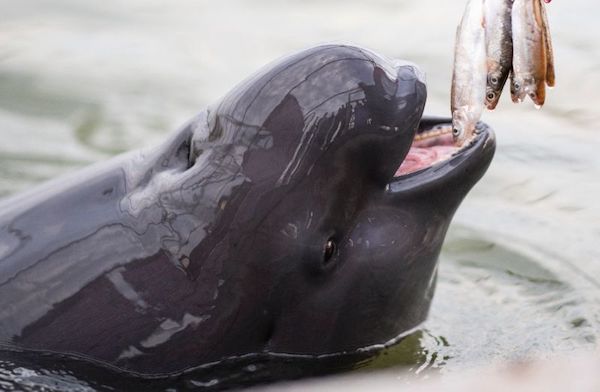
AFP Photo/Johannes EISELE
China’s government estimates there were 1,012 wild Yangtze finless porpoises in 2017, compared to more than 1,800 giant pandas, which is no longer endangered. But researchers see signs of hope. Porpoise numbers fell by nearly half from 2006-2012 to an estimated 1,040. But the rate of decline has slowed markedly since then, suggesting that conservation may be making a dent. A central component of the rescue effort is the introduction of porpoises to several conservation areas off the busy river, where researchers say numbers have been actually increasing. [..] Chinese officials are keen to avoid a repeat of the “baiji”, or Yangtze dolphin, the river’s only other aquatic mammal, which since 2006 has been considered extinct in a huge conservation setback for China. Losing the “smiling angel” would be a further tragedy, conservationists say.
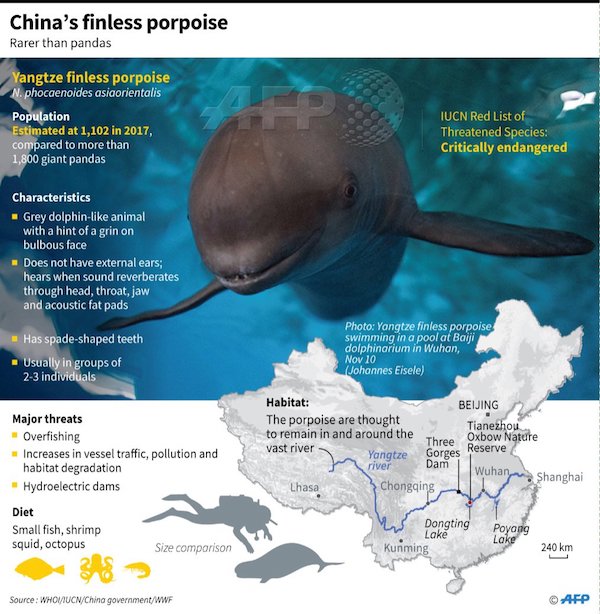









Home › Forums › Debt Rattle December 20 2018